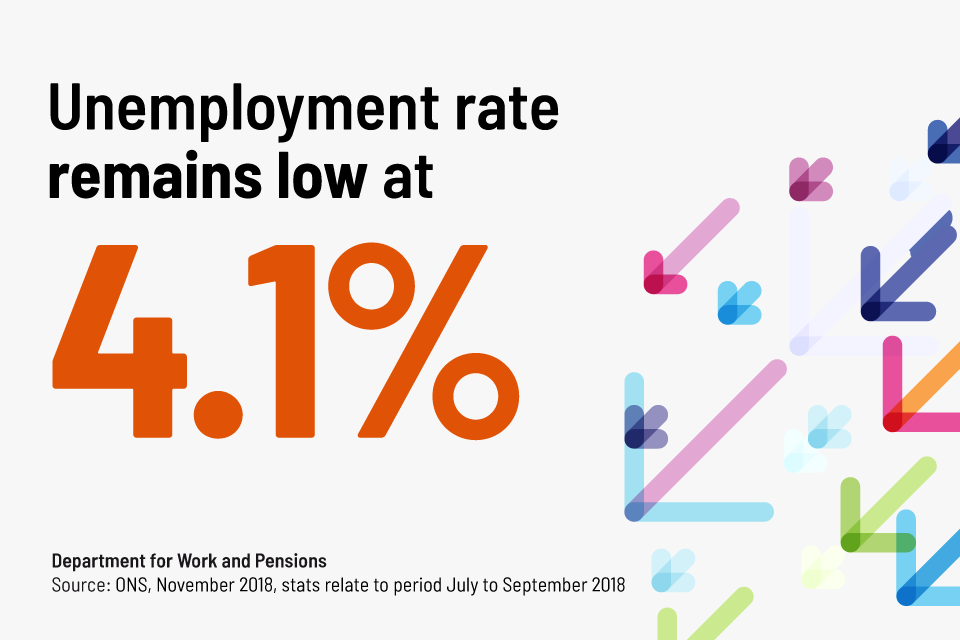Press release: Eighth month of UK wage growth with disabled employment at record high
As the UK celebrates its first ever ‘Purple Tuesday’ highlighting the huge potential of disabled consumers’ £249bn spending power, new figures show more than half of disabled people are now in work, outnumbering those who are workless.
In a further boost to the economy and consumer spending, wage growth outpaced inflation for an eighth month in a row, rising 0.9% in real terms (against CPIH inflation). Regular pay before inflation grew at its fastest in almost a decade, 3.2%.
The UK’s unemployment rate has also nearly halved since 2010, now at 4.1%.

The latest figures from the Office for National Statistics also revealed the employment rate remains high, at 75.5%, with a record number of people in employment – and over 3.3 million more people in work since 2010.
Work and Pensions Secretary Esther McVey said:
As we celebrate the anniversary of Disability Confident, we can see seismic shifts in opportunities for disabled people, with 973,000 more in work since 2013.
That’s empowering hundreds of thousands more disabled people with new career opportunities, and creating a brighter future.
Since 2010, employment has risen and unemployment has fallen in every single region of the UK. And with an average of 1,000 people moving into work each and every day, and three quarters of all new jobs in permanent, full time and high skilled roles, this shows our welfare reforms are working and delivering for people across the country.
Employment Minister Alok Sharma said:
Once again, the benefits of a strong jobs market are paying off, with the eighth month of real-terms wage growth for UK workers and the highest regular pay growth in almost a decade.
With more people now in work than ever before and unemployment almost halving since 2010, we are delivering an economy that gives people the opportunity of a better future.
And it’s worth noting that of the over 3.3 million jobs created in the British economy since 2010, three quarters are permanent, full time and in higher level occupations.
Figures also show three quarters of jobs created since 2010 are full time, permanent roles that are in higher skilled occupations, which typically bring higher earnings – all ambitions of the government’s Industrial Strategy which seeks to create better, well-paying jobs fit for the future.
This month also marked the anniversary of the anniversary of the Disability Confident scheme, which helps to transform business attitudes across the country and make our workplaces more inclusive. Over 9,000 businesses have signed up so far.
The government is helping even more people benefit from a well-paid job by:
- backing businesses to create good jobs with our modern Industrial Strategy, while ensuring they play by the rules, so we are closing tax loopholes, strengthening workers’ rights, and tightening the rules big businesses must follow
- investing in the infrastructure, training and apprenticeships we need for our future, with public investment at the highest sustained level in 40 years
- introducing Universal Credit which is helping people move into work faster and stay in it longer, while recent Budget measures mean 2.4 million families will keep an extra £630 per year of what they earn
- helping people stay in work longer with our Fuller Working Lives strategy, which supports employers to recruit, re-train and retain older workers
- tackling inequalities in employment highlighted by the Race Disparity Audit, through targeted support in 20 areas around the country and £90 million announced by the Prime Minister to help young people
- arranging work experience sessions for students through Jobcentre Plus, in over 1,400 schools
The work experience scheme is being rolled out across the country, to ensure young disadvantaged kids aged 12 to18 get opportunities including work experience to learn about the world of work and consider future career options. So far, the partnership between Jobcentre Plus and local schools has resulted in around 12,000 sessions for pupils, parents and teachers helping to prepare pupils for the world of work.
Read the latest labour marker statistics from the Office for National Statistics.
Contact Press Office
Media enquiries for this press release – 020 3267 5106
Press Office
Caxton House
Tothill Street
London
SW1H 9NA
London Press Office (national media and London area enquiries only – not questions about personal claims)
020 3267 5144
Out-of-hours (journalists only)
07623 928 975
England and Wales (local media enquiries)
029 20 586 then 097 or 098 or 099
Scotland (local media enquiries)
0131 310 1122
Follow DWP on:
- Twitter – www.twitter.com/dwppressoffice
- Facebook – www.facebook.com/dwp
- LinkedIn – www.linkedin.com/company/dwp
- YouTube – www.youtube.com/dwp